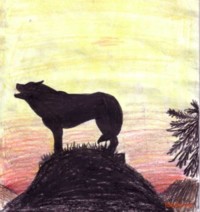
|
|
Class 4 Main Lessons |
|
||
| Norse mythology | Human and Animal | Geography | ||
| Classes 1 to 3 (6-9 years) | Classes 4 to 5 (9 to 11 years) | Classes 6 to 7 (11 to 13 years) | ||||
| Class 1 | Class 2 | Class 3 | Class 4 | Class 5 | Class 6 | Class 7 |
Norse Mythology - Alliteration
|
[Ancient Norse verse didn't rhyme with the end-rhyme we are familiar with. Rather it used the sound at the beginning of the word, or alliteration. This was predominantly consonantal, e.g. 'girt with gold' (where the 'g's alliterate) or 'beautiful, brave and bold' (the 'b's rhyme). This gives the verse a strong will character. Any vowels at the beginning of a word were said to alliterate, i.e. they did not have to be the same vowel. So, for example, 'insolent, agile and evil' alliterate because they all begin with a vowel sound. In German, alliteration is called Stabreim or 'staff-rhyme', and a nice exercises is to have the children hold wooden staves and stamp them on the ground with each alliteration. Apart from adding some impressive percussion to the speech, the children need to be very awake to stamp the staff in the right place as the alliteration in, for example, the Edda, constantly moves from line to line. In the first line of the Edda below, the staves would stamp on earliest and Ymir (because vowels alliterate). In line two the staves stamp on sea and salty. In line three on earth and upper (vowels). In line four there is a double alliteration, so the staffs stamp on gaping and green and also on nothing and nowhere - a real challenge to wakefulness! In line five the stamps are on land, lifted and -loft. In the sixth line, made, Midgard and matchless. And so on.] From
The Edda
3 - 6
|
|
From: First
Lay of Helgi the Hunding-Slayer
‘Twas in olden times, as eagles screamed and holy steams flowed from the Heaven’s Fells, when in Braland Borghild bore to the world a hero high-hearted, Helgi by name. At night in hall the norns did come, to the lord they allotted his life and fate: to him awarded under welkin most fame, under heaven to be among heroes first. His fate-thread spun they to o’erspread the world, for Borghild’s bairn in Braland castle; they gathered together the golden threads and in moon-halls middle they made them fast. |
|
Praying Mantis
Mantis sits on the branch of a tree, Still as an old dead twig is he. His legs held together as though in prayer, His pin-prick eyes are fixed in a stare. Fly buzzes past, suspicious and quick. Mantis is still as a dry withered stick, But inside he’s alert, with a clear focused thought... And SNAP! go his legs - and the fly is caught. Paul King
Paul King |
|
[This
will of course have to be adapted to your local situation.]
Where am I? In the hand of God is the Universe, In the Universe is our galaxy, In our galaxy is the Solar System, In the Solar System is the Earth, On Earth is the continent of Africa, In Africa is the country of South Africa, In South Africa is the province of the Western Cape, In the Western Cape is the city of Cape Town, In Cape Town is the suburb of Kenilworth, In the suburb of Kenilworth is Marlowe Road, In Marlowe Road is Michael Oak School, In Michael Oak is Class Four, In Class Four are rows of desks, In one of those rows is my desk, Here I sit. Here I sit at my desk in one of the rows in Class 4 in Michael Oak in Kenilworth in Cape Town, in the Western Cape in South Africa in Africa on Earth in the Solar System in the galaxy in the universe in the hand of God. |
| Classes 1 to 3 (6-9 years) | Classes 4 to 5 (9 to 11 years) | Classes 6 to 7 (11 to 13 years) | ||||
| Class 1 | Class 2 | Class 3 | Class 4 | Class 5 | Class 6 | Class 7 |